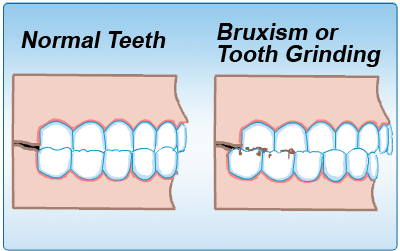Naturally Treating and Curing Teeth Grinding (Bruxism)
Naturally Treating and Curing Teeth Grinding (Bruxism)
Teeth grinding (bruxism) usually occurs at night while the sufferer sleeps, and normally it is first noticed by the person’s spouse. In children, teeth grinding is likely to go unnoticed until significant damage has occurred.
Bruxism should be considered a serious health condition, because a sufferer’s tooth enamel may be eventually destroyed, leaving effected teeth extremely vulnerable to decay. The cosmetic consequences can be terrible too. In the worst cases, the aftermath of bruxism requires the complete removal of teeth.
The dental and medical establishments usually recommend that sufferers wear mouth retainers (night guards) during sleep periods, to protect against further damage. While this is a wise option for some sufferers of bruxism, it is nonetheless important to note that this reflects an institutional policy of categorically ignoring all causes of this condition. The standard approach is, at best, a temporary suppression of a single symptom of some potentially serious underlying issues. It is like removing the batteries from a smoke detector, instead of fighting the fire that is causing the alarm. Teeth grinding is always a symptom of another health issue, so masking the symptom with a retainer should only be a short-term solution.
In some cases, teeth grinding is related to the presence of an underbite. It is unknown why an underbite increases the risk of bruxism. Nutritional therapies may not be enough to completely eliminate the problem in these cases. In a small subset of cases, bruxism can be the result of nerve damage, infection, or other factors that cannot be determined.
Nutritional Factors
Teeth grinding normally occurs because of nutritional deficiencies, so it can usually be corrected nutritionally. Since the condition typically indicates that the patient is malnourished, the wisest initial treatment option is to change the diet. It is unwise to merely compensate with supplements, or just mask the problem with a mouth retainer. Supplementation is somewhat effective, but supplementation is never truly an adequate replacement for a healthy (preferably organic) diet.
Scientific research of bruxism is sorely lacking, which is largely because mouth guards are considered to be an adequate treatment measure, and it is believed that there is little pharmaceutical money to be made from this disorder. Due to the lack of financial incentives, practically all available bruxism research is conducted outside of the United States, and most of the testing is based upon animal studies.
Recommended Supplementation
Vitamin B-5 This vitamin is found naturally in fish, chicken, and eggs. It is often sold in supplement form by its chemical name, pantothenic acid.
Magnesium and Calcium Magnesium and calcium always work together, and are nearly useless alone. In many cases, a magnesium deficiency is the root cause of bruxism. Magnesium is found in green, leafy vegetables, and nuts (especially cashews and walnuts). For certain individuals who do not eat enough vegetables, our Green Drink may be enough to solve the problem if drank regularly. Vitamin D is also necessary for proper absorption of magnesium and calcium, and it may be obtained by both sunlight exposure and by eating fish. Some individuals will not be able to get enough vitamin D due to liver impairment, which is usually a result of pharmaceuticals or heavy metal toxicity.
Potassium High levels of potassium can be found in bananas, tomatoes, potato skins, oranges or orange juice. It is in green leafy vegetables to a lesser degree.
Vitamin C This exists in almost all fruits, and it is in the highest amounts in citrus fruits.
Vegetarian and Child Victims
Vegetarians do not get an adequate amount of vitamin B-5 (pantothenic acid), so bruxism is one of many diseases that plague them. Vegetarians attempt to correct their chronic malnutrition from their self-inflicted starvation with supplementation, but dietary supplements are only capable of augmenting an adequately nutritious diet. They can never replace it. Oral problems are often the first indication that a vegetarian’s or a vegan’s health is suffering from malnutrition. There are a disproportionate number of vegetarians with teeth grinding issues, which is unexpectedly high; even when their chronic vitamin B-5 deficiencies are accounted for with supplements. It is likely that there are necessary nutrients in meats and fish, which have not yet been identified by researchers. Ironically, whenever children experience bruxism, it is most often related to their refusal to eat vegetables. Therefore, the ideal diet is balanced.
Unusual Cases
There are some cases whereby a dietary problem is not the root cause of bruxism, but the diet is virtually always a factor. For example, teeth grinding is sometimes caused by anti-depressant drugs or other medications, because the drugs deplete the body of magnesium and other vital nutrients.
Nerve damage can also cause people to grind their teeth, even during their waking hours. This too is caused by anti-depressants and artificial sweeteners. In such cases, efforts should be made to stimulate nerve repair or regeneration. Effective techniques include supplementation with MSM and the B vitamins, especially vitamin B-6 and B-12, which gained fame for their seemingly miraculous effects upon nerves. Healthy fats should also be incorporated into the diet, such as butter. The goat cheese and flax oil blend that is described in our Budwig Protocol article is ideal. For more information about repairing nerve damage, reference the Bell’s palsy article.
by Thomas Corriher For Healthwyze
Be the first to post a message!
